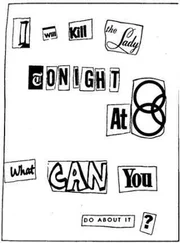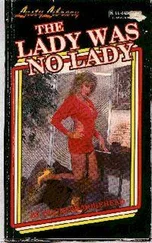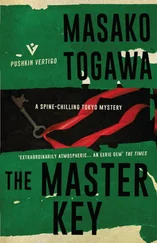It was a two-story building faced with unpainted mortar, a simple enough place. A stairway ran up the side and along the outer corridor; anyone could come and go freely. Ideal for a hideout , Shinji thought.
On the corner door of the ground floor there was a small sign, which read “Manager.” Shinji knocked on the door; it was opened by a woman who took one look at him, turned around and shouted “Darling!” before making her way back inside. She looked haggard and worn-out; a few lank hairs were glued to her forehead by sweat.
The manager proved to be a man of about forty with a pale and puffy face. It appeared that he was a jobbing tailor, for he wore a tape measure around his neck. Shinji presented his name card and asked about the apartment that Ichiro Honda had rented.
“Oh, you mean Mr. Ueda’s room. It’s just the way it was.”
“You haven’t rented it out yet?”
“Well, since all this happened, the owner wasn’t sure what to do, but then we got a letter from Mr. Ueda’s family saying that they would like to keep the apartment on until everything is settled. So it’s left just as it was.”
Shinji noticed that the manager still referred to Honda as “Ueda,” the name under which the room had been rented. He asked if he could see the room, and the manager readily assented, slipping on a pair of sandals and reaching for a bunch of keys.
“I’m stuck to my sewing machine all day long, so I welcome the chance to get away,” he confided as he led Shinji up the stairway. He came to a door and opened it; the air inside was musty.
Shinji saw an iron bedstead, a wardrobe like a locker, a wooden table, and two chairs. The manager opened the window with some difficulty. “Should open them once in a while, I suppose,” he murmured.
“Did Honda have many visitors?”
“No one in particular. I used to think it odd, but then he told me he was a scenario writer and only took the room to work privately, so I thought no more of it. But he was such a quiet and nice person; I wish I hadn’t testified against him, you know, that he had an adhesive plaster on his face when he moved out, but I really didn’t mean… you know, I didn’t understand…” The manager smiled weakly, his face revealing his fear that his evidence had put the rope around Honda’s neck.
“There’s only one other thing that I remember… well, it was my wife, really. She swears she heard the sound of a woman weeping in Mr. Ueda’s room one day when he was out. Sounds like a ghost story, doesn’t it? It made the police laugh, anyway.”
“About when would that have been?”
“Let me see… it would have been six months before Mr. Ueda was arrested, I would say.”
Shinji thanked him and left the Meikei-so.
Walking back along the street, he reflected upon what the manager had told him. Could it be true, this story of a woman weeping in Honda’s room?
Judging from the fact that he still kept on referring to Honda as “Mr. Ueda” however often Shinji had corrected him, he seemed to be a man subject to idée fixe .
And if it was true, what could have been the meaning of those female sobs heard in the room?
Shinji thought about it for a while, but by the time he got back to the main road he had dismissed the matter from his mind. After all, he reasoned, it could not be very important, could it?
4
Getting off the suburban train, Shinji soon found a taxi outside the station.
Only one woman remained on the list that he had been given, a woman for whom he still entertained tender feelings although he had not seen her for several years. He had left her until last; soon he would see her again.
He had had to work not only through college but to get into college. He worked as a children’s tutor in the evenings and on weekends; by day, he was a part-time deliveryman at a department store or a seasonal assistant at the post office. At festival and gift-giving times he had been particularly busy and heavily laden. Often he would wander the streets, his down-at-heel shoes white with dust or snow, looking for some particularly obscure address, the heavy sack on his back bulging with parcels wrapped in the distinctive paper of the store. These labors, particularly when he was working for the college entrance exam, left him little time for classes, so he tended to spend a lot of time in the college library.
Gradually he got to know the young woman who was employed there as a lending clerk; they were attracted to each other, it was plain, but much as he had wanted to date her, he rarely had the money to do it. So in all those months and years he had only met her outside the college seven, eight, perhaps ten times. And amongst those few times, he had only made love to her once, quickly and furtively in the six-by-nine-foot room where he lodged.
Eventually he passed into the college and became even more busy attending classes as well as earning his keep on the side, so they drifted apart and, in time, ceased to see each other.
This short acquaintanceship remained ingrained in his brain, banal as it now sometimes seemed to him, this brief affair between a struggling student and a library clerk. But how often he wondered as he sat in the taxi, which was climbing the slope to the college campus, do such brief, doomed lovers ever meet again? A faint expectation stirred in his breast.
The taxi came to the gates of the college, beyond which no cars were allowed. He paid his fare and got out and began to walk toward the old brick building; the road was lined with cherry trees. The first green grass of summer was beginning to thrive on the lawn in front of the campus.
He cast his mind back to how it had been in his student days. Summer… so hot; the lawn in front of the library would grow so fast that even weekly mowings could not keep it down. Memories… a row of tall sunflowers; sweat that poured down him no matter how he had wiped his brow; the library, empty in the long summer vacation; a girl who worked there and always wore white blouses… Steeped in these memories of student life, he paused for a while in front of the library before suddenly going in as if he was only doing so on second thoughts.
Inside, it was still just the same: musty and cool.
He went up to the counter. Michiko Ono, the lending clerk, was writing on a heap of small cards. Just as he remembered, she sat with a slightly bent back, her head tilted slightly at an angle that he found charming. But the former childish expression on her face was no more. He read the passing of time in the lines and wrinkles about her eyes. What those lines meant was the slow death of a human soul.
“Miss Ono,” he said quietly, his voice choking a little.
She stopped her writing and looked up as if she was disgruntled at being interrupted in her task. Then recognition crept over her features, mixed with a look of mild shock. She blinked two or three times and then, in a voice throbbing with emotion, said, “Mr. Shinji! It’s you! It’s been a long time!”
“I was passing by so I thought I’d drop in.”
“I’ll be off in half an hour—we close at five-thirty.”
He glanced at his wristwatch. “Well, then, maybe I can do a little research while I’m waiting. Graduates are allowed to borrow books, aren’t they?”
“Yes, provided you don’t take them away. Use the reading room.”
“Well, do you have anything on blood types?”
She ran through her cards with a practiced hand and soon produced two volumes.
“This is all we seem to have—unless, of course, you look in the encyclopedias, too.”
Thanking her, Shinji carried the books to the reading room. He had wanted to talk to her for a little longer, but he knew the library rules—no talking or disturbing other people. The books she had given him were, as one might expect in a legal library, works on forensic medicine. He extracted all he could find that he thought might be of use, noting it in a small notebook that he carried, and then closed the books and lay back in the chair, smoking aimlessly and gazing up at the dirty ceiling until Michiko came.
Читать дальше












